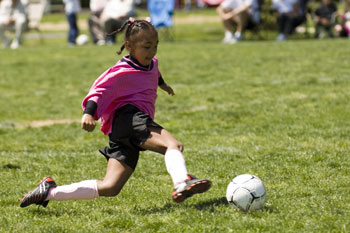Protecting the Mental Health of Vulnerable Children Through Sport

A major public health study has found that children who live with adverse childhood experiences (ACEs) (e.g. sexual and physical abuse, parental separation and living with domestic violence), who participate in sport are less likely to experience mental illness in later life.
Exercise & Sports Science Australia (ESSA) is urging all Australians to be mindful of the holistic benefits of physical activity for children and the role sports may play in preventing poor mental and physical health.
'Not only is physical activity associated with increased resilience, it also improves mental health, increases brain activity, and helps to build social relationships," said Anita Hobson-Powell, ESSA Chief Executive Officer.v Among respondents who reported four or more traumatic childhood experiences, those who were receiving current treatment for a mental illness, but regularly participated in sports, was almost half (12%) of those who were not active at all (23%).
The relationships between sports participation in childhood and lower incidence of mental illness is significant, with regular participation in childhood sport shown to be a protective factor against poor mental health. This link is also true between regular adult participation in sports and current mental illness.
'The findings of this study adds to a growing body of research showing that access to exercise is an important contributor to mental well-being for children and may have a particular role in helping children overcome the impact of exposure to trauma and adversity," stated Professor Zachary Steel who leads the Trauma and Mental Health Research program at UNSW Sydney.
The study also found that participation in sports was reduced as the ACE count increased; with a 74% participation rate of those with no childhood adversity, to 56% of those with four or more adverse events. This highlights how those who are exposed to the risk factors of experiencing a mental illness are less likely to be active, and the barriers that exist for physical activity.
'The people most likely to benefit from physical activity and sports are often those who are least likely to have access to appropriate programs or services. This study shows the important role of being physically active in promoting and maintaining positive mental health," explained Dr Simon Rosenbaum from UNSW Sydney and the Black Dog Institute.
The report noted that the relationships found here suggest increased sports participation should be further explored as a means of developing resilience and protecting mental health.
'We need to ensure we are creating a society that prioritises movement and creates environments that allows for our most vulnerable members, including children, to be physically active from childhood through to older age."
Recognising the literacy gap on the right -tools' children need to be physically active and to know how to exercise right for their health, ESSA developed the educational platform, Exercise Right for Kids.
Exercise Right for Kids provides an insight on how exercise delivered by an experienced and qualified professional, such as an accredited exercise physiologist, can help children manage the symptoms of their chronic condition and improve their quality of life. Children are guided through their chronic condition or injury to break down the barriers of exercise. To download resources for children, such as factsheets, activity charts, e-books or posters, head to the Exercise Right for Kids website.
For more information on how to exercise right for your mental health, please contact your local accredited exercise professional via the ESSA website.
MORE



